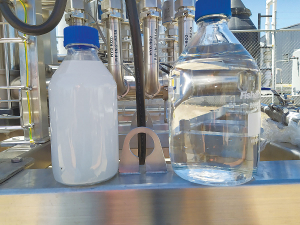Top nutritionals exporter seeks growth capital
New Zealand manufacturer of nutritional and wellness products, NIG Nutritionals (NIGN), is seeking capital to help it meet strong demand from China and wider Asian markets.
 A company claims to have a world-first technology that delivers clean water from the processing of milk and milk products.
A company claims to have a world-first technology that delivers clean water from the processing of milk and milk products.
A South Auckland milk processor is taking part in a world-first project that delivers clean water from the processing of milk and milk products.
NIG Nutritionals has been working with clean technology company Hydroxsys during the past 12 months to deliver the technology. Since January this year, NIG has been trialling Hydroxsys equipment at its facility at Paerata, south of Auckland.
Hydroxsys chief executive Mark Hartstone says the company has developed proprietary "world first" filtration technology that challenges current clean in place (CIP) and waste treatment systems, not only in dairy, but also wider food and beverage manufacturing and industries like wastewater and mining sectors.
For now, he says, Hydroxsys is focusing on food and beverage (including dairy) manufacturing. Water is a key resource in the manufacturing of all food products and specifically milk products.
The plant at NIG Nutritionals will be complete in about four months and will also be used to demonstrate Hydroxsys' technology to potential customers.
NIG Nutritionals chief executive Chris Macbeth says liquid milk processing activities generate liquid waste products that need to be treated prior to discharge under consent from Auckland Council and WaterCare.
“NIG Nutritionals values and ethos are built around nurturing our customers with the best in nutritional solutions,” Chris Macbeth says. “This extends to our environment as we believe that what we put into the environment is what we will receive from it in the future.
“With this in mind, we wanted to find new ways of reducing our environmental impact and improving our contribution to environmental sustainability.”
By introducing the Hydroxsys system, NIG Nutritionals substantially improves the quality and cleanliness of its wastewater discharge.
“We can effectively reduce our ‘waste’ and return up to 90% of the wastewater volume back to our system as a source of clean water,” Macbeth says.
“Further work will be required to provide assurances that this clean water is able to be recycled back into our manufacturing plants or returned to the environment to replace the water that we take from the aquifer. However, we are very confident, based on the results we have gathered over many months of trials, that we can deliver clean water from our manufacturing processes.”
The Meat Industry Association of New Zealand (MIA) today announced that Chief Executive Officer Sirma Karapeeva has resigned from the role.
The winners of the 2026 Hawke’s Bay/Wairarapa Dairy Industry Awards were announced at the annual awards dinner held at Copthorne Solway Park in Masterton on Thursday evening.
Environment Southland is welcoming this week’s decision by the Environmental Protection Authority (EPA) to approve the release of Blaptea elguetai, a leaf‑feeding beetle that will help control the highly invasive Chilean flame creeper.
This March, the potato industry is proudly celebrating International Women’s Day on 8 March alongside the International Year of the Woman Farmer, recognising the vital role women play across every part of the sector — from paddocks and packhouses to research, leadership, and innovation.
Fruit trader Seeka posted a record profit and returns to shareholders in 2025.
Recent weather events in the Bay of Plenty, Gisborne/Tairawhiti, and Canterbury have been declared a medium-scale adverse event.
OPINION: Staying with politics, with less than nine months to go before the general elections, there’s confusion in the Labour…
OPINION: Winston Peters' tirade against the free trade deal stitched with India may not be all political posturing by the…